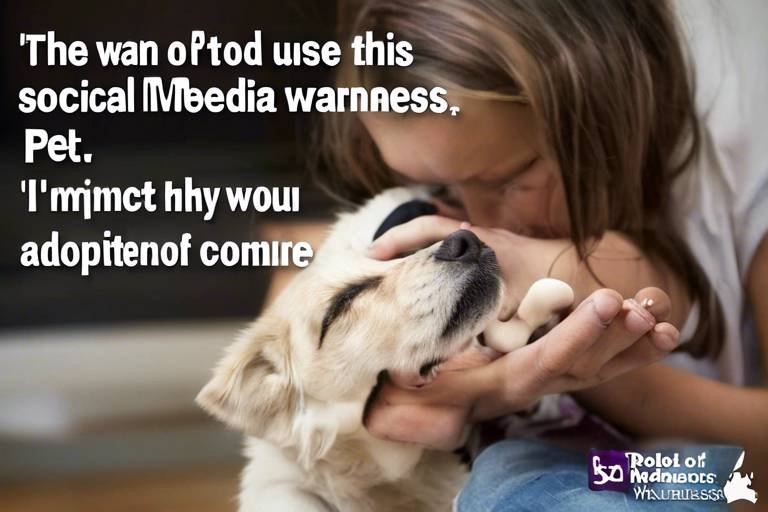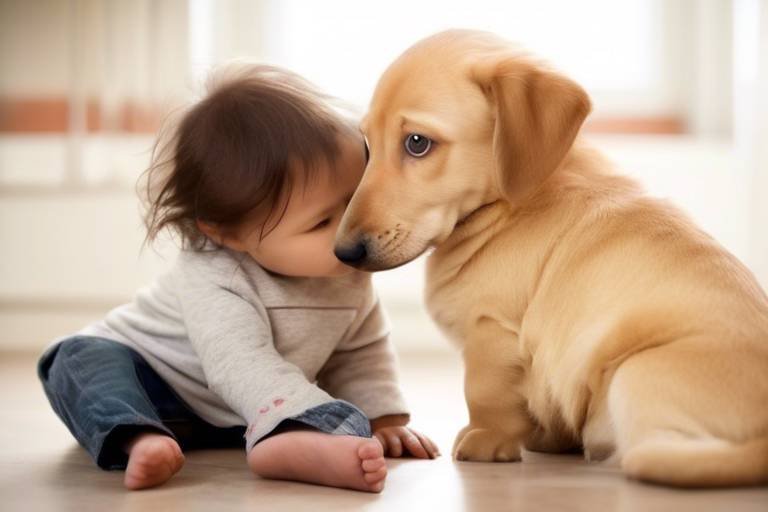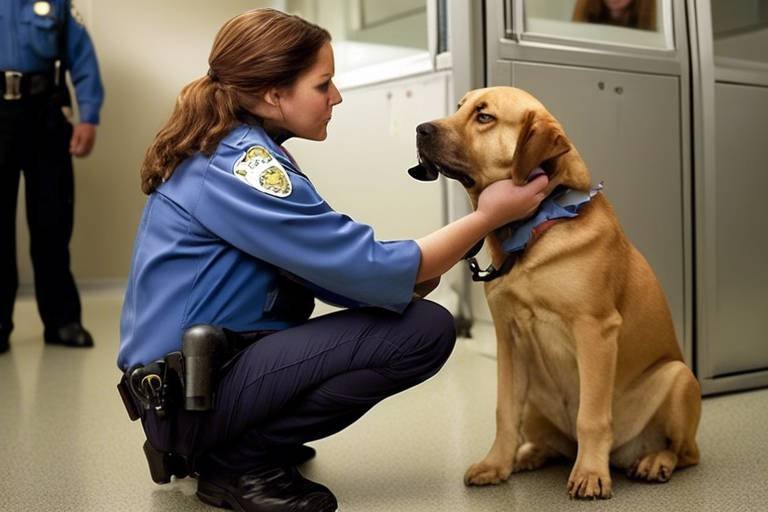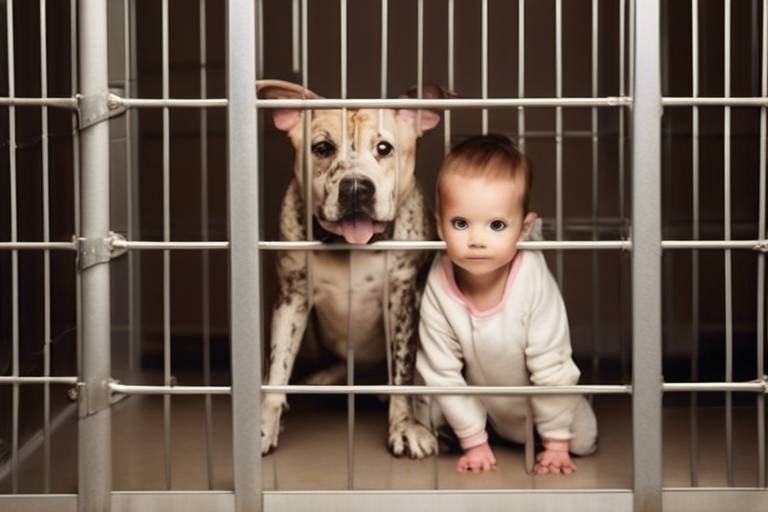Tips for Finding a Pet Adoption Mentor
Adopting a pet is one of the most rewarding experiences you can have, but it can also come with its fair share of challenges. Whether you're a first-time pet owner or have had furry companions before, having a mentor can make all the difference in ensuring a smooth transition for both you and your new friend. A mentor can provide valuable insights, share their experiences, and offer support throughout the adoption process. But how do you find the right mentor who can guide you effectively? Let's dive into some tips that will help you on this journey.
A mentor in the pet adoption world is more than just a helpful figure; they are a beacon of knowledge and support. Think of them as your personal guide who walks you through the intricate maze of pet adoption, helping you avoid pitfalls and making informed decisions. Their responsibilities typically include:
- Sharing Knowledge: A good mentor will provide you with information on what to expect during the adoption process, from paperwork to home preparation.
- Offering Emotional Support: Adopting a pet can be emotionally taxing, and having someone to turn to for encouragement can be invaluable.
- Providing Practical Advice: They can offer tips on pet care, training, and integration into your home.
Understanding these roles can help you choose a mentor who aligns with your specific needs and expectations.
Finding the right mentor can sometimes feel like searching for a needle in a haystack. But fear not! There are various avenues you can explore to connect with potential mentors who can help you navigate the pet adoption process.
One of the best places to start your search is at local animal shelters. Many shelters have established programs that connect new adopters with experienced volunteers. These individuals are often passionate about animal welfare and have firsthand experience in the adoption process. They can share invaluable insights that will help you feel more prepared.
Consider engaging with volunteer opportunities at your local shelter. Not only will you be helping animals in need, but you’ll also have the chance to meet potential mentors who are dedicated to helping others. These interactions can lead to meaningful relationships that extend beyond the shelter.
Attending adoption events can be a fantastic way to meet seasoned adopters and mentors. These gatherings often attract knowledgeable individuals who are eager to share their experiences and advice. Just imagine standing beside someone who has successfully adopted multiple pets; their stories and tips could be exactly what you need!
In today’s digital age, online forums and social media groups focused on pet adoption can be a treasure trove of resources. Engaging with these communities allows you to connect with seasoned adopters who are more than willing to share their wisdom. Platforms like Facebook, Reddit, or specialized pet forums can provide a wealth of information and support.
Once you’ve identified potential mentors, it’s crucial to evaluate their qualities to ensure they’re the right fit for you. Here are some key attributes to consider:
A mentor who has firsthand experience in pet adoption can offer practical advice that you won’t find in books. Look for someone who has successfully navigated the adoption process multiple times, as their insights will be invaluable in preparing you for your own journey.
Good communication is the cornerstone of any successful mentor-mentee relationship. Seek out a mentor who can convey information clearly and is approachable for questions and concerns. You want someone who makes you feel comfortable discussing your worries and uncertainties.
Q: How do I know if I need a mentor for pet adoption?
A: If you're feeling overwhelmed or unsure about the adoption process, a mentor can provide the guidance and support you need.
Q: Can I have more than one mentor?
A: Absolutely! Having multiple mentors can give you diverse perspectives and a broader range of advice.
Q: What if I can’t find a mentor in my area?
A: Don’t worry! Online communities are a great alternative, allowing you to connect with experienced adopters from around the world.
Q: How can I build a relationship with my mentor?
A: Communication is key. Don’t hesitate to reach out with questions, share your experiences, and express gratitude for their help.

Understanding the Role of a Mentor
When it comes to pet adoption, the journey can often feel overwhelming, especially for first-time adopters. This is where a mentor can make all the difference. A mentor in the pet adoption process is not just a guide; they are a beacon of hope and knowledge, illuminating the path for new adopters. Think of them as your personal coach, ready to share insights and experiences that can lead you to a successful adoption. Their role encompasses various aspects, including providing emotional support, sharing practical advice, and helping you navigate the complexities of bringing a new pet into your home.
One of the primary responsibilities of a mentor is to offer knowledge. They have likely been through the adoption process themselves and can share valuable lessons learned along the way. This could include tips on how to choose the right pet for your lifestyle, what to expect during the initial days of adoption, and how to handle common challenges that arise. A mentor can also help you understand the specific needs of different breeds or species, ensuring that you make an informed decision that benefits both you and your new furry friend.
Beyond just knowledge, a mentor provides emotional support. Adopting a pet is a big commitment, and it’s normal to have doubts or fears. A good mentor will be there to reassure you, share their own experiences, and remind you of the joys that come with pet ownership. They can help you develop a plan for integrating your new pet into your home, addressing any concerns you may have about behavior, training, or health. This emotional connection can be incredibly comforting, especially during the transition period.
In addition to these roles, a mentor can also be a great resource for community connections. They often have ties to local shelters, veterinarians, and pet trainers, which can be invaluable as you embark on your journey. They might even introduce you to other pet owners, creating a support network that extends beyond just your mentor. This sense of community can make a world of difference, as you can share experiences, seek advice, and celebrate milestones together.
To summarize, the role of a mentor in the pet adoption process is multifaceted. They are your guide, support system, and community resource. When searching for a mentor, consider what specific qualities and experiences you value most. Whether you need someone to provide practical advice or emotional encouragement, the right mentor can transform your adoption experience into a joyful and fulfilling journey.

Where to Find Potential Mentors
Finding a mentor in the pet adoption process can sometimes feel like searching for a needle in a haystack. But fear not! There are several fantastic avenues to explore that can lead you straight to the right mentor who can guide you through this rewarding journey. Think of it as embarking on an adventure where each stop brings you closer to a wise companion who understands the ins and outs of pet adoption. Let’s dive into some of the best places to find these potential mentors.
Your local animal shelter is a treasure trove of knowledge and experience. Many shelters have dedicated programs designed to connect new adopters with seasoned volunteers who are passionate about animal welfare. These individuals often have a wealth of information and can share valuable insights that can ease your adoption journey. Imagine walking into a shelter and finding someone who has dedicated their life to helping pets find their forever homes; it's like discovering a hidden gem! By engaging with these volunteers, you can gain a deeper understanding of the adoption process and what it truly means to welcome a furry friend into your life.
One of the best ways to identify potential mentors is to get involved in volunteer programs at your local shelter. Not only will you be contributing to a noble cause, but you'll also have the opportunity to meet individuals who are deeply invested in animal welfare. These volunteers often have firsthand experience with various aspects of pet care and adoption, making them excellent resources. While volunteering, you might find yourself asking questions and sharing experiences, which can naturally lead to mentorship opportunities. It’s like diving into a community where everyone shares a common goal: helping animals find loving homes.
Adoption events are another fantastic way to meet experienced adopters and potential mentors. These gatherings are often buzzing with excitement, as many knowledgeable individuals gather to share their experiences and advice. Picture yourself at an event filled with adorable pets and passionate people ready to share their stories. You can ask questions, engage in conversations, and even find a mentor who resonates with your values and needs. These events not only allow you to meet potential mentors but also provide a supportive environment where you can learn from others who have successfully navigated the adoption process.
In today's digital age, the internet is a powerful tool for connecting with others. Online forums and social media groups focused on pet adoption can be invaluable resources for finding mentors. Engaging with these communities allows you to tap into a wealth of knowledge from seasoned adopters who have been in your shoes before. Imagine joining a vibrant online community where members share their experiences, tips, and tricks for successful pet adoption. By participating in discussions, asking questions, and sharing your own journey, you can build relationships that may lead to finding a mentor who can guide you through the process. Remember, the more you engage, the more likely you are to find someone who can help you along your path.
In conclusion, finding a mentor in the pet adoption process doesn't have to be a daunting task. By exploring local animal shelters, engaging in volunteer programs, attending adoption events, and connecting with online communities, you'll increase your chances of finding that perfect guide. So, take a deep breath, step out there, and start your journey towards finding not just a mentor, but a friend who will help you navigate the wonderful world of pet adoption!
Q: How do I approach someone to be my mentor?
A: Approach potential mentors with genuine interest and respect. Share your goals and explain why you believe they would be a great fit for you. Most people appreciate being asked and are happy to help!
Q: What if I can’t find a mentor right away?
A: Don’t worry if it takes time! Keep engaging with communities, attending events, and volunteering. Sometimes, mentors come into your life when you least expect it.
Q: Can I have more than one mentor?
A: Absolutely! Having multiple mentors can provide you with diverse perspectives and insights, enriching your understanding of the pet adoption process.
Local Animal Shelters
When it comes to finding a mentor in the pet adoption process, are often your best bet. These shelters are not just places where animals are housed; they are vibrant communities filled with passionate individuals dedicated to animal welfare. Many shelters have established programs designed specifically to connect new adopters with experienced volunteers. These volunteers are typically well-versed in the nuances of pet adoption and can provide invaluable insights that make the transition smoother for both you and your new furry friend.
Imagine walking into a local shelter, the sounds of excited barks and meows filling the air. As you explore the aisles of adorable animals waiting for a forever home, you might encounter a volunteer who has been working there for years. This person has seen countless adoptions, and their experiences can help guide you through the maze of decisions you’ll face. They can answer your burning questions, share stories of successful adoptions, and even provide tips on how to prepare your home for a new pet.
Additionally, many shelters offer volunteer programs that allow you to engage directly with the staff and other volunteers. By immersing yourself in these programs, not only do you get to learn more about animal care and adoption, but you also get a chance to identify potential mentors who share your passion for animal welfare. These mentors can offer a wealth of knowledge, from understanding the behavioral traits of different breeds to knowing how to handle common challenges faced by new pet owners.
Another excellent opportunity to meet potential mentors is by attending adoption events. These events are often hosted by local shelters and can be a fun and informative way to connect with other adopters and seasoned pet owners. You’ll find knowledgeable individuals eager to share their experiences, and you might just meet someone who resonates with you on a personal level. The camaraderie found at these events can lead to lasting friendships and mentorships that extend well beyond the adoption process.
In summary, local animal shelters are treasure troves of knowledge and support for anyone looking to adopt a pet. By engaging with the staff, volunteers, and fellow adopters, you can find a mentor who not only understands the process but is also genuinely invested in ensuring that both you and your new pet thrive together.
- How do I find a local animal shelter?
You can search online for animal shelters in your area or visit websites like Petfinder and Adopt-a-Pet to find listings. - What should I ask a potential mentor?
Inquire about their experiences with pet adoption, challenges they faced, and tips they can share to help you prepare for your new pet. - Can I volunteer at a shelter even if I don't plan to adopt?
Absolutely! Volunteering is a great way to support animal welfare and meet potential mentors.
Volunteer Programs
Engaging in at your local animal shelter can be one of the most rewarding experiences you can have while seeking a mentor in the pet adoption process. Not only do you get to spend time with adorable animals, but you also immerse yourself in the community of passionate individuals dedicated to animal welfare. These programs often attract seasoned volunteers who have a wealth of knowledge about adoption processes and the unique needs of different pets.
When you volunteer, you have the opportunity to observe and interact with experienced mentors in action. They can provide insights into the challenges and joys of pet adoption, share their personal stories, and guide you through the intricacies of bringing a new furry friend into your home. In essence, volunteering acts as a bridge between you and the wealth of experience these mentors possess.
Many shelters offer structured volunteer programs that may include:
- Fostering: Some shelters need temporary homes for pets, allowing you to gain firsthand experience in caring for animals and understanding their behavioral needs.
- Event Assistance: Helping with adoption events or fundraisers gives you a chance to meet potential mentors while contributing to the shelter’s mission.
- Training Sessions: Participating in training programs can connect you with knowledgeable individuals who can offer guidance on proper pet care and behavior.
To get started, reach out to your local shelter and inquire about their volunteer programs. Most shelters are more than happy to welcome new volunteers and will provide you with the necessary training and support. By actively engaging in these programs, you not only enhance your understanding of pet adoption but also build valuable relationships with mentors who can help you navigate your journey.
Remember, the connections you make through volunteering can lead to lifelong friendships and an enriched understanding of what it means to be a responsible pet owner. So, roll up your sleeves, dive into the world of volunteering, and watch as doors open to new opportunities and mentorship in the realm of pet adoption!
Q: How do I find volunteer opportunities at my local shelter?
A: You can visit the shelter's website or contact them directly to inquire about available volunteer programs. Many shelters also post opportunities on social media or community boards.
Q: Do I need any special skills to volunteer?
A: While some roles may require specific skills, most shelters welcome volunteers of all backgrounds. A passion for animals and a willingness to learn are the most important qualifications!
Q: Can volunteering lead to adoption opportunities?
A: Absolutely! Many volunteers find that their involvement in shelters leads to meaningful connections with animals, sometimes resulting in adoption.
Adoption Events
Adoption events are not just gatherings; they are vibrant celebrations of life, hope, and second chances for countless animals. Imagine a bustling park filled with wagging tails, curious cats peeking from carriers, and the joyful chatter of families excited to find their new furry friends. These events are organized by local shelters, rescue groups, and community organizations, aiming to connect pets in need of homes with loving families. Attending an adoption event can be a transformative experience, not only for the animals but also for you as a potential adopter.
One of the most compelling reasons to attend these events is the opportunity to meet experienced adopters and mentors face-to-face. You can engage in heartfelt conversations, ask questions, and absorb invaluable insights from those who have walked the path of pet adoption before you. These seasoned adopters often have stories that resonate deeply, filled with both challenges and triumphs. They can offer you practical advice on how to prepare your home for a new pet, the best ways to introduce your new companion to your family, and tips on training and socialization.
Moreover, adoption events often feature a variety of animals, giving you the chance to interact with different breeds and personalities. You might find yourself drawn to a playful puppy or a wise old cat. The atmosphere is usually filled with excitement, as potential adopters can see the animals’ personalities shine in a social setting. It’s a unique opportunity to observe how different pets behave around people and other animals. You might even discover that the perfect match for your family is a pet you hadn’t initially considered!
To make the most of your experience at an adoption event, consider the following tips:
- Research: Before you go, check the event’s details online. Many organizations list the animals available for adoption, allowing you to narrow down your choices.
- Prepare Questions: Think about what you want to know. Questions about the pet's history, behavior, and health can help you make an informed decision.
- Be Open-Minded: Sometimes, the pet you think you want might not be the right fit. Be open to meeting different animals that might surprise you!
In addition to finding a mentor and discovering your new pet, adoption events also provide a sense of community. You’ll be surrounded by like-minded individuals who share your passion for animal welfare. This can lead to lasting friendships and connections, as you bond over shared experiences and challenges in pet ownership. Plus, many events include fun activities, food vendors, and even raffles, making it a day out for the whole family!
So, whether you're a first-time adopter or a seasoned pet parent looking to expand your furry family, don’t underestimate the power of adoption events. They can be the perfect starting point for your journey, filled with knowledge, support, and the joy of finding a new companion. Remember, every pet deserves a loving home, and you might just be the one to provide it!
Q: What should I bring to an adoption event?
A: It’s a good idea to bring a leash, carrier, and any necessary paperwork if you’re considering adopting on the spot. Also, don’t forget to bring your questions!
Q: Can I adopt a pet at the event?
A: Yes, many adoption events allow for on-the-spot adoptions, but be sure to check the specific requirements of the organization hosting the event.
Q: Are there fees associated with adopting a pet at these events?
A: Typically, there are adoption fees that help cover the costs of vaccinations, spaying/neutering, and other care. These fees vary by organization.
Q: What if I can’t adopt a pet right now?
A: You can still help by volunteering, fostering animals, or simply spreading the word about the event to friends and family!
Online Communities
In today's digital age, have become a treasure trove for those seeking guidance in pet adoption. These virtual spaces are filled with passionate individuals who share a love for animals and a wealth of knowledge. By engaging with these communities, you can not only find potential mentors but also connect with like-minded individuals who understand the challenges and joys of pet adoption.
One of the most significant advantages of online communities is the diversity of experiences they offer. Whether you're a first-time adopter or someone looking to add another furry friend to your family, you can find people who have walked the same path. Many forums and social media groups are dedicated to specific breeds, types of pets, or even local adoption events, allowing you to tailor your search for information and support.
When searching for a mentor online, consider joining platforms such as Facebook groups, Reddit threads, or dedicated pet adoption forums. These spaces often have members who are not only experienced adopters but also volunteers or staff from local shelters. They can provide you with firsthand insights into the adoption process, tips for integrating a new pet into your home, and even recommendations for trustworthy shelters.
To get started, here are some types of online communities you might explore:
- Facebook Groups: Look for groups in your area or those focused on specific breeds. These groups often have members who are eager to share their experiences and advice.
- Reddit: Subreddits like r/pets or r/adoptapet are great places to ask questions and receive guidance from seasoned pet owners.
- Pet Adoption Forums: Websites dedicated to pet adoption often have forums where you can connect with other adopters and mentors.
Engaging in these online communities can lead to lasting friendships and invaluable support. Don't hesitate to ask questions or share your concerns; most members are more than willing to help. Remember, the goal is to create a network of support that can guide you through the exciting journey of pet adoption.
Q: How can I find a mentor in an online community?
A: Start by joining relevant Facebook groups, Reddit threads, or pet adoption forums. Engage with the members, ask questions, and look for individuals who offer helpful advice consistently.
Q: Are online mentors as effective as in-person mentors?
A: Yes, online mentors can provide valuable insights and support. Many have extensive experience and can offer guidance that is just as effective as face-to-face interactions.
Q: What should I look for in an online mentor?
A: Look for someone with experience in pet adoption, effective communication skills, and a genuine passion for animal welfare. Engaging with someone who resonates with your values will enhance your learning experience.

Qualities to Look for in a Mentor
When it comes to finding the right mentor for your pet adoption journey, there are several key qualities you should consider. A mentor is not just someone who has been through the process; they should also embody certain traits that can significantly enhance your experience. First and foremost, look for a mentor with experience in adoption. This means they have successfully navigated the ups and downs of bringing a pet into their home. Their firsthand knowledge can be invaluable, offering you practical advice that you won’t find in books or online articles.
Next, an effective mentor should possess strong communication skills. It’s essential that they can convey information clearly and concisely, ensuring that you fully understand each step of the adoption process. A mentor who is approachable and patient will make it easier for you to ask questions and express any concerns you may have. Remember, adopting a pet can be both exciting and overwhelming, and having someone who can communicate effectively will make the journey smoother.
Another important quality is a genuine passion for animal welfare. A mentor who truly cares about the well-being of pets will be more likely to guide you towards making informed and compassionate decisions. This passion often translates into a wealth of knowledge about various breeds, training techniques, and common challenges faced by new pet owners. Their enthusiasm can also inspire you to become a more responsible pet owner.
Additionally, consider a mentor’s availability. You want someone who has the time to dedicate to your learning process. A mentor should be willing to engage in discussions, provide resources, and share their experiences without making you feel rushed. Regular check-ins or scheduled meetings can help keep the lines of communication open and ensure you’re receiving the support you need.
Lastly, don’t underestimate the importance of empathy and understanding. A mentor who can relate to your feelings and challenges will create a safe space for you to share your concerns. They should be able to listen actively and provide reassurance as you navigate the emotional aspects of adopting a pet. After all, the bond between a pet and their owner is profound, and having someone who understands that connection can make a world of difference.
In summary, when searching for a mentor in the pet adoption process, keep these qualities in mind:
- Experience with Adoption: Look for someone who has successfully adopted pets before.
- Effective Communication Skills: Choose a mentor who can explain things clearly and is easy to talk to.
- Passion for Animal Welfare: Find someone who genuinely cares about animals and their well-being.
- Availability: Ensure your mentor has the time to support you throughout the process.
- Empathy and Understanding: A mentor who can relate to your feelings will help you feel more comfortable.
Q: How do I approach a potential mentor?
A: Start by expressing your interest in pet adoption and ask if they would be willing to share their experiences and advice. A simple conversation can often lead to a deeper mentor-mentee relationship.
Q: What if I can't find a mentor in my area?
A: Don’t worry! Consider joining online communities or forums dedicated to pet adoption. Many experienced adopters are eager to share their knowledge and can provide support virtually.
Q: Is it okay to have more than one mentor?
A: Absolutely! Different mentors can offer various perspectives and experiences, enriching your understanding of the adoption process.
Q: How long should I expect to rely on my mentor?
A: The duration can vary based on your needs. Some may require guidance only during the adoption process, while others may benefit from ongoing support as they adjust to life with their new pet.
Experience with Adoption
When it comes to finding a mentor for pet adoption, one of the most crucial qualities to consider is their . A mentor who has walked the path of adopting pets themselves brings a wealth of knowledge that can be invaluable to new adopters. Think of it like having a seasoned traveler guide you through a foreign land; they know the best routes, the hidden gems, and the potential pitfalls to avoid. Similarly, an experienced mentor can offer practical advice on everything from choosing the right pet to navigating the emotional ups and downs that often accompany the adoption process.
For instance, a mentor with multiple successful adoptions under their belt can share first-hand stories that illustrate what to expect. They can provide insights on how to assess a pet's behavior during the meet-and-greet, tips for introducing a new pet to your home, and strategies for dealing with initial challenges, such as adjusting to a new environment or managing behavioral issues. Their personal anecdotes can serve as both a guide and a source of inspiration for new adopters, helping to ease apprehensions and build confidence.
Moreover, mentors with extensive adoption experience can also help you understand the long-term commitment involved in pet ownership. They can discuss the reality of caring for a pet, including the financial responsibilities, the time commitment, and the emotional labor that comes with nurturing a living being. This realistic approach can help set appropriate expectations and prepare you for the joys and challenges ahead.
To find a mentor with the right experience, consider asking potential candidates about their own adoption journeys. Here are some questions you might ask:
- How many pets have you adopted?
- What challenges did you face during the adoption process?
- Can you share a memorable experience that taught you something valuable about pet ownership?
By engaging in these conversations, you can gauge their depth of experience and determine if they align with your needs as a new adopter. Remember, the right mentor will not only have the experience but also the willingness to share their journey with you, making your transition into pet ownership smoother and more enjoyable.
Effective Communication Skills
When it comes to the mentor-mentee relationship in pet adoption, are absolutely essential. Imagine embarking on a journey into the world of pet adoption, filled with excitement, questions, and perhaps a few fears. You want someone by your side who can not only provide information but also make you feel comfortable discussing your concerns. A mentor with strong communication skills can bridge that gap, ensuring that you feel supported every step of the way.
One of the first things to look for in a mentor is their ability to listen actively. This means they should not only hear your words but also understand the emotions behind them. A mentor who practices active listening will often ask follow-up questions, showing that they care about your thoughts and feelings. This kind of engagement creates a safe space where you can express your worries and uncertainties about adopting a pet, whether it's about the responsibilities involved or how to handle a pet's behavior.
Moreover, clarity in communication is paramount. Your mentor should be able to break down complex information into digestible pieces. For instance, if you're unsure about the adoption process, a good mentor will guide you through it step-by-step, explaining everything from filling out applications to understanding the adoption fees. This clarity not only helps you grasp the process better but also builds your confidence as you move forward.
Additionally, a mentor should be approachable and friendly. If you feel intimidated or uncomfortable, you're less likely to ask the questions you need answered. A mentor who fosters a warm and welcoming atmosphere encourages open dialogue, making it easier for you to seek advice or share your experiences. Think of it like having a chat with a friend rather than a formal meeting with an expert. This friendly approach can make all the difference in your adoption journey.
Another vital aspect of effective communication is feedback. A great mentor will provide constructive feedback on your questions or concerns, helping you refine your understanding. For instance, if you're worried about how to introduce your new pet to your home, your mentor can offer practical tips based on their own experiences. This not only helps you feel more prepared but also reinforces the mentor's role as a guiding figure in your journey.
In summary, when searching for a mentor in the pet adoption process, prioritize those who exhibit strong communication skills. Look for someone who listens actively, communicates clearly, remains approachable, and provides constructive feedback. These qualities will not only enhance your learning experience but also ensure that your transition into pet ownership is as smooth and enjoyable as possible.
- What should I look for in a pet adoption mentor? Look for someone with experience in pet adoption, strong communication skills, and a genuine passion for animal welfare.
- How can I find a mentor for pet adoption? Consider reaching out to local animal shelters, attending adoption events, or joining online communities focused on pet adoption.
- Why is effective communication important in the mentor-mentee relationship? Effective communication fosters trust, clarity, and support, making the adoption process smoother for new pet owners.
Frequently Asked Questions
- What is the role of a pet adoption mentor?
A pet adoption mentor acts as a guide for new adopters, offering support and sharing valuable insights throughout the adoption process. They help ensure that both the pet and the new family transition smoothly into their new lives together.
- Where can I find a mentor for pet adoption?
You can find potential mentors at local animal shelters, through volunteer programs, and by attending adoption events. Additionally, online communities and social media groups focused on pet adoption are great places to connect with experienced adopters willing to share their knowledge.
- What qualities should I look for in a pet adoption mentor?
When searching for a mentor, consider their experience with pet adoption, effective communication skills, and genuine passion for animal welfare. A mentor with firsthand experience can provide practical advice, while good communication ensures that your questions and concerns are addressed clearly.
- How can I approach a potential mentor?
Approaching a potential mentor can be as simple as introducing yourself and expressing your interest in pet adoption. Be open about your needs and what you hope to learn. Most mentors are happy to share their experiences and insights with someone eager to learn.
- Are there any costs associated with having a pet adoption mentor?
Typically, having a mentor is a free resource, especially if you find one through a local shelter or community group. However, if you seek professional guidance, there may be fees involved. Always clarify any potential costs upfront.



















